South Sudan
Refugees giving back
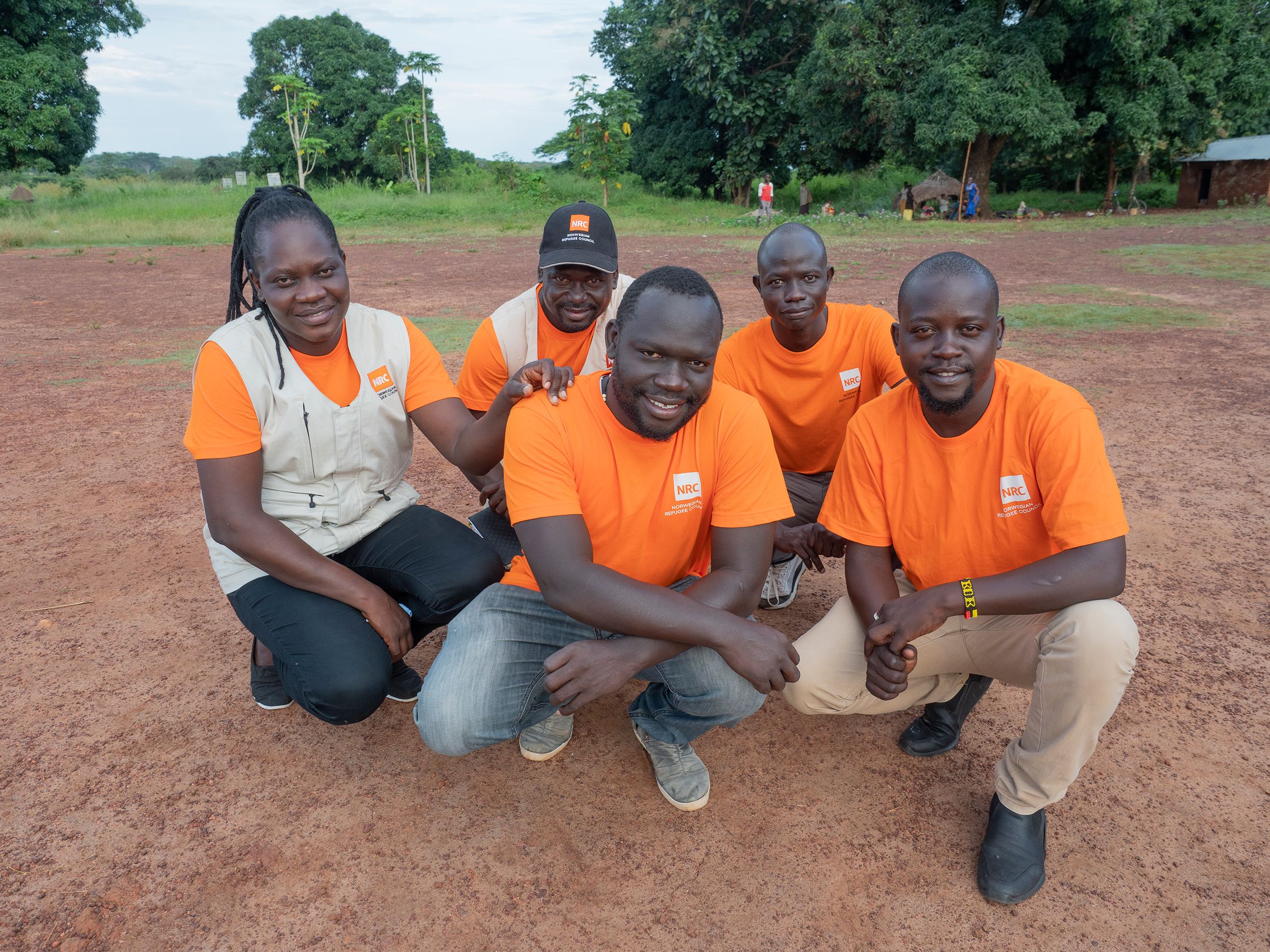
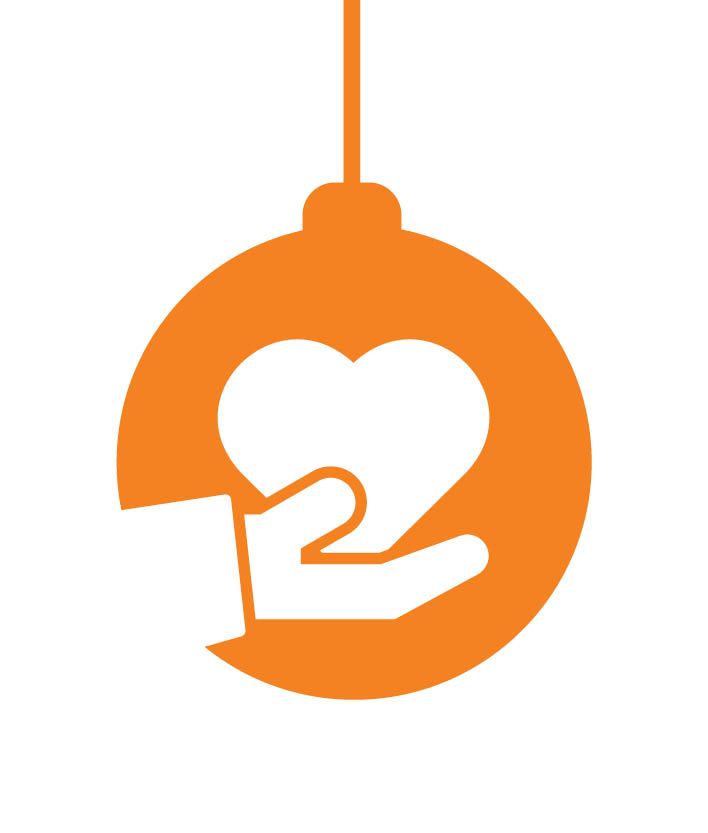
They are on the frontline, saving the lives of people displaced by fighting and floods. One thing they have in common is that they have all been refugees themselves and have all received humanitarian aid.
Now they are giving something back.

After an hour-long flight from Juba, South Sudan’s capital, and a seven-hour drive in a 4x4 on rough, unpaved and muddy roads, the Emergency Rapid Response Mobile (ERRM) team has just arrived in Ezo.
This town in the south-west of South Sudan is on the border with the Democratic Republic of the Congo, and close to the point where both countries intersect with the Central African Republic (CAR).
Delivering aid on the frontline
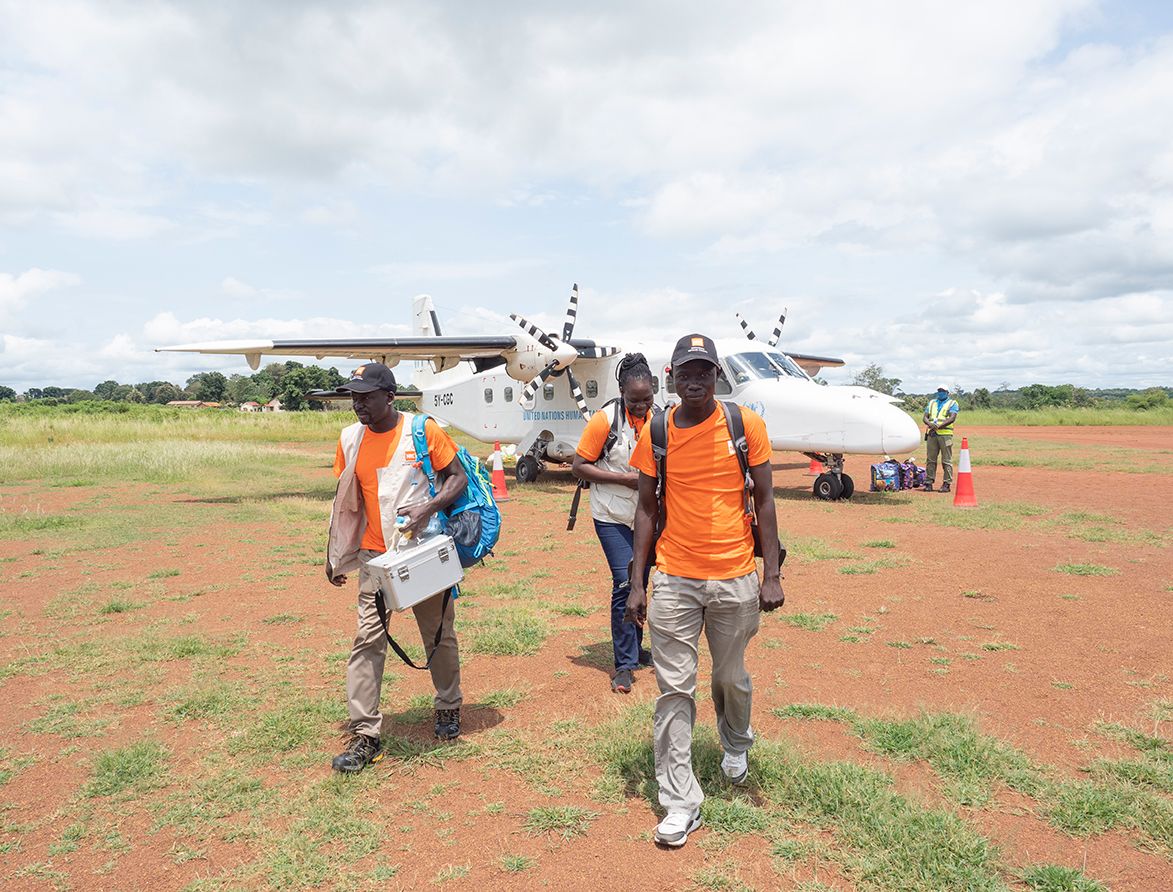
Fresh fighting has displaced thousands of people in the area. The ERRM team, part of the Norwegian Refugee Council’s extensive aid operation in South Sudan, is there to assist and save lives.
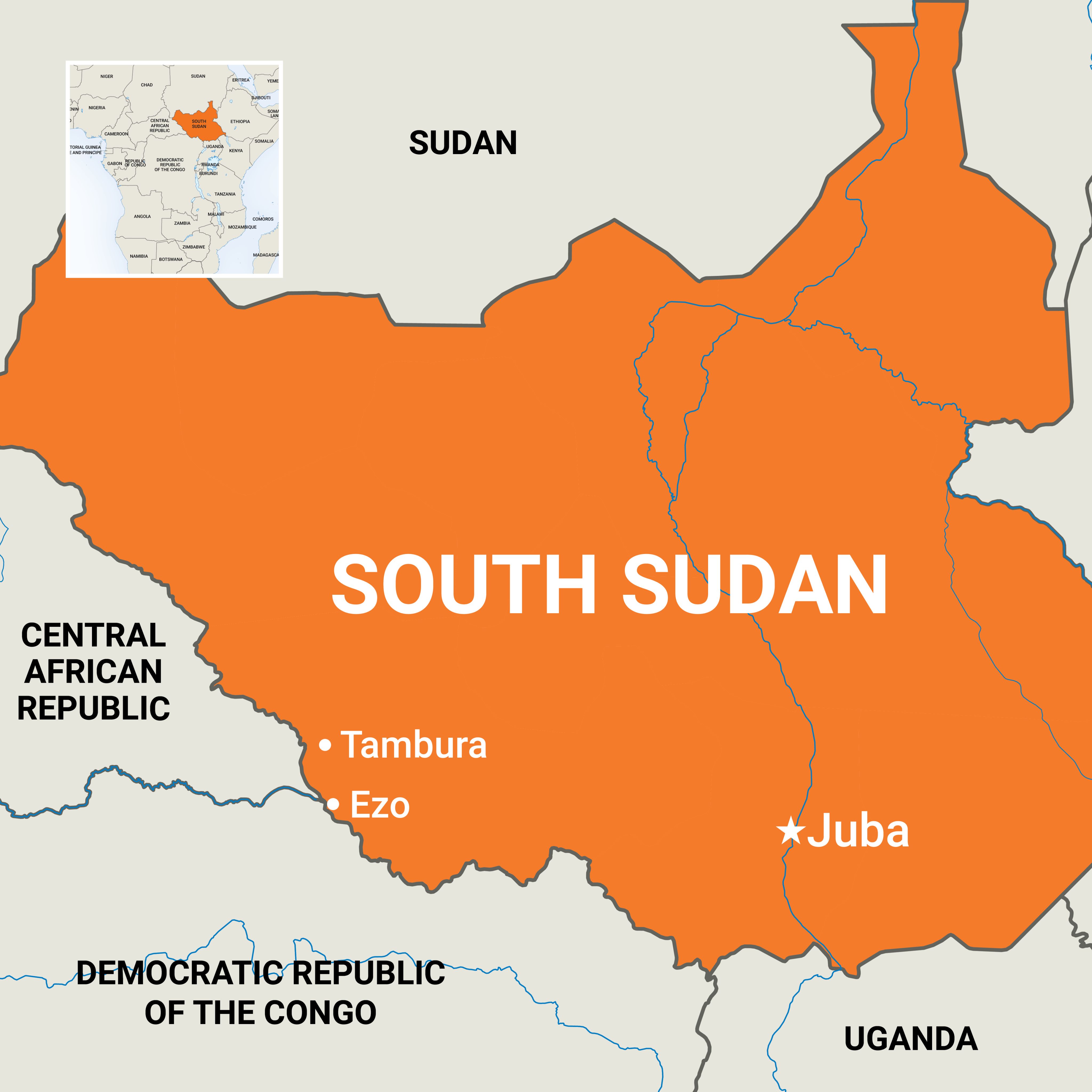
A map of South Sudan, showing Ezo and Tambura.
A map of South Sudan, showing Ezo and Tambura.
Team members Obale, Leju, Loke, Lumago and Sitima have all been displaced themselves. They know the location. They speak the language. They know what it is like to be in this dire situation, and they know the importance of emergency assistance.
Now they want to give something back.
Seven hours by car
on rough, unpaved and muddy roads


SOUTH SUDAN
In 2011, South Sudan gained independence from Sudan, bringing an end to Africa's longest civil war. Two years later, violent conflict broke out after a political disagreement between President Salva Kiir and former Vice-President Riek Machar.
The fighting has since forced over four million people to flee to other parts of the country or over the border to neighbouring countries. Some 8.3 million people – more than two-thirds of the population – need some form of humanitarian assistance and protection.
Ezo
More than 7,500 people, many of them women and children, have settled in a field next to a church. Some seek shelter in the church at nighttime, but most sleep under trees or out in the open.
Some of them arrived just a week ago and new families are arriving every day.
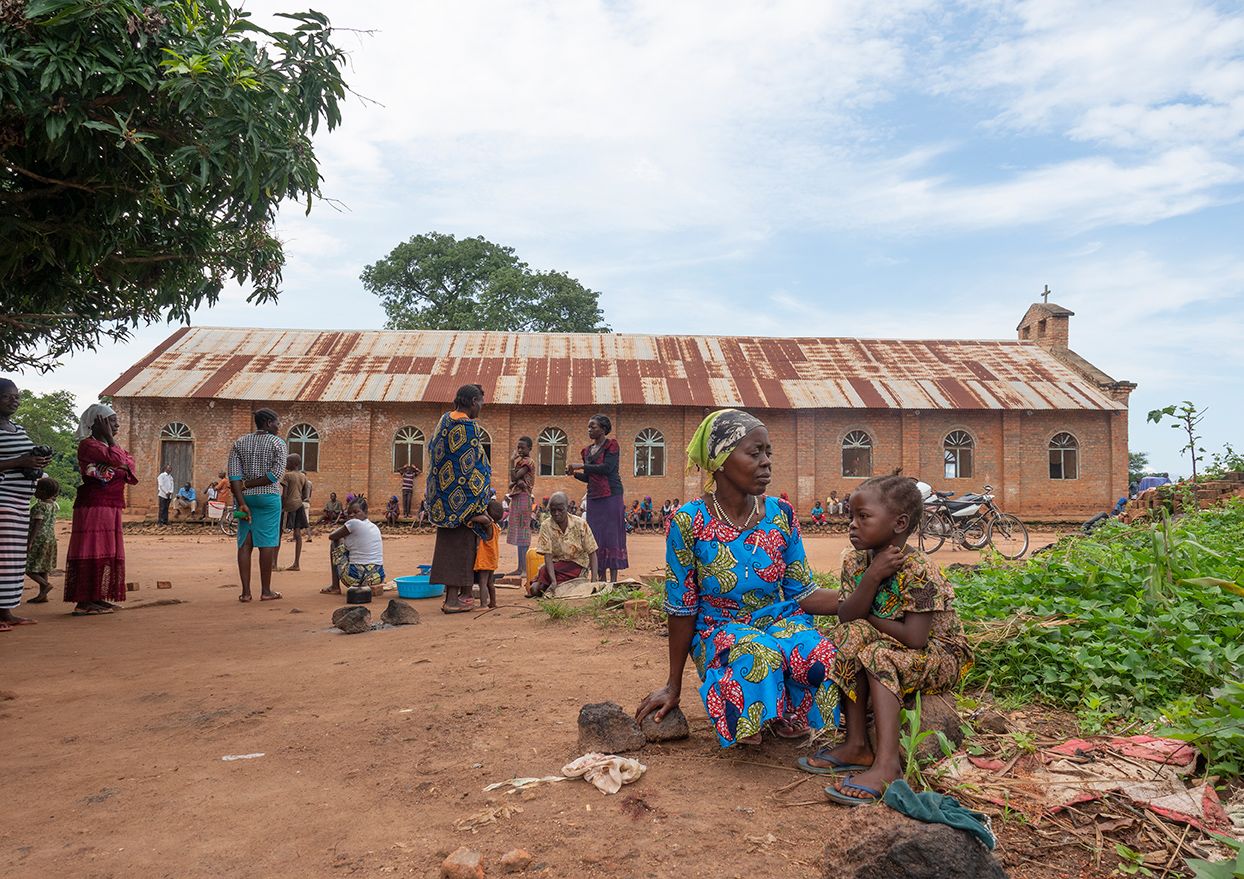
Sitima Joyce Justin, 42
POSITION: Education Coordinator
BACKGROUND: Teacher specialising in Geography and Economics, educated at Makerere University, Uganda. She also has a master’s degree from the University of Bamberg in Germany. She has been displaced several times and spent several years as a refugee in three neighbouring countries.
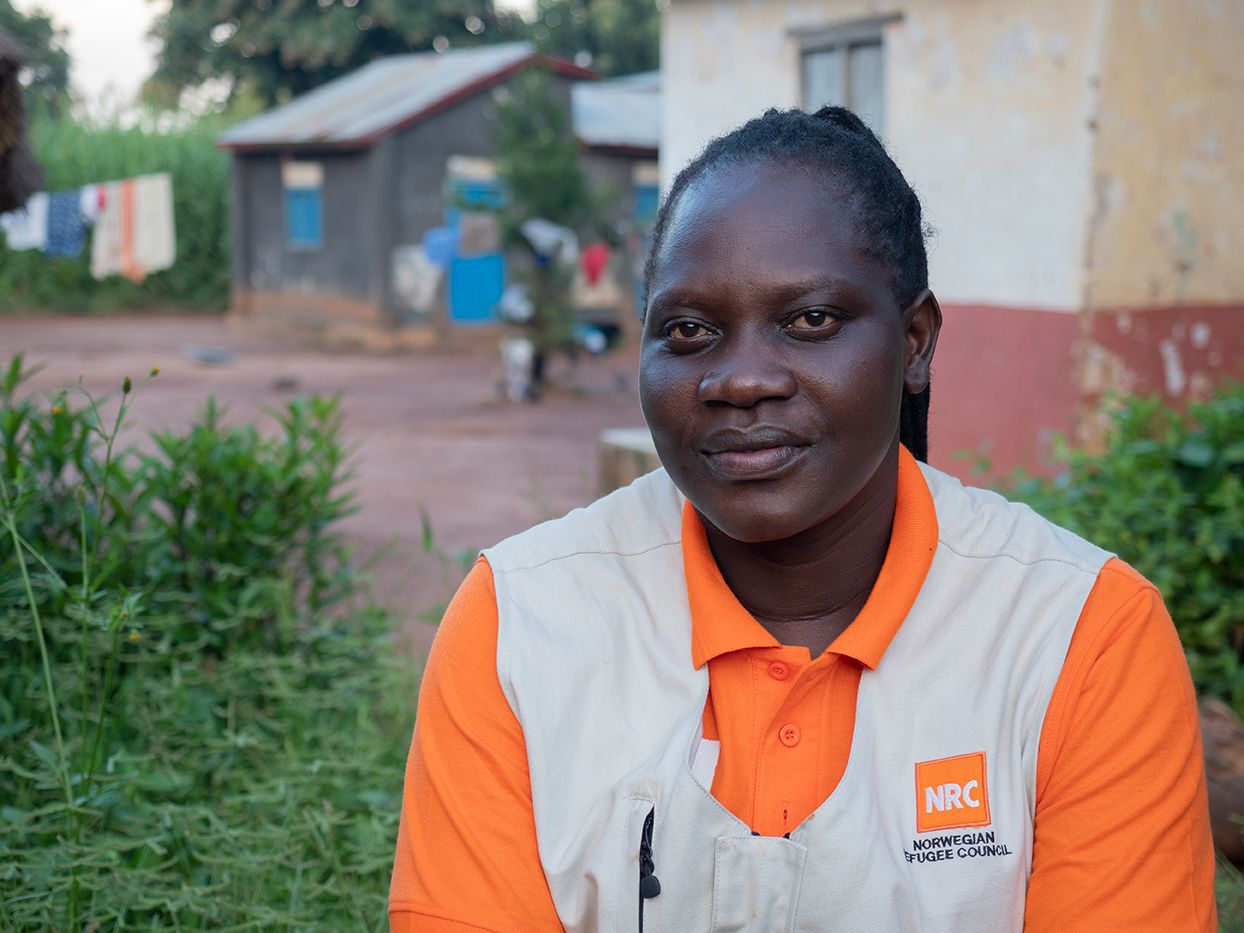
For some of the team members, the situation is very challenging. Sitima is full of emotions. More than 30 years ago she had to flee for her life along the same roads she is now travelling on.
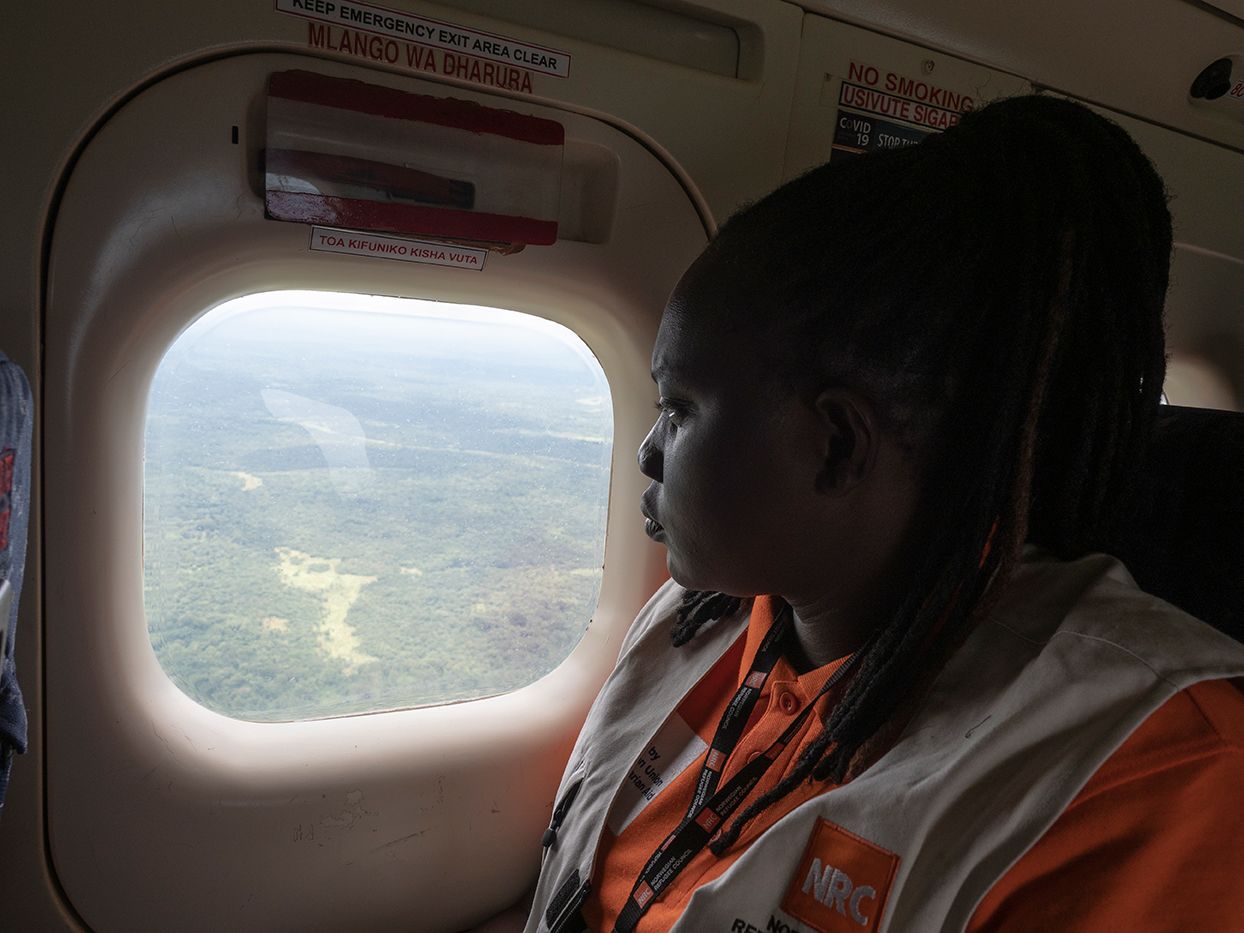
“Coming to Ezo brings back childhood memories: how we left our home village fleeing towards the Central African Republic," says Sitima Joyce Justin. Photo: Ingrid Prestetun/NRC
“Coming to Ezo brings back childhood memories: how we left our home village fleeing towards the Central African Republic. I really reflect on how the situation was, on the challenges we met along the way, on the long distances we walked, sometimes without food, on sleeping outside under the trees,” she says.
“I chose this work because I have been through the same challenges myself. I know what it means to be a refugee. Sometimes you reach a location, and you find that there is no shelter, there is nothing, so you sleep under the trees, exposed to heavy rain or burning heat from the sun.”
Outside the nearby church a group of women are collecting their belongings. Next to them, children are playing joyfully. They have slept in the church overnight. Now the locals are entering the church for morning mass.
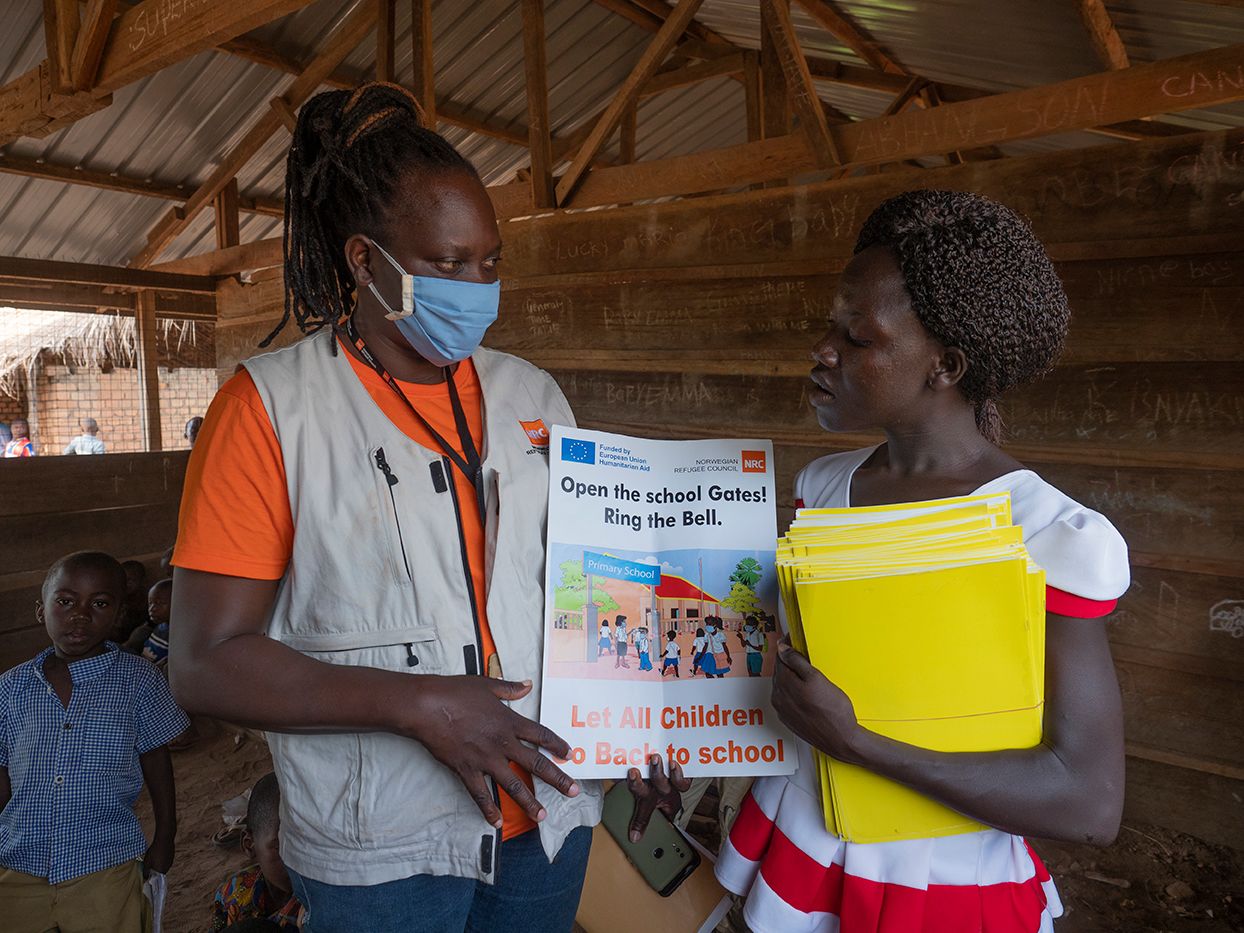
Sitima Joyce Justin talking to Christine Angudeyo, headteacher of Progressive Primary and Nursery School in Ezo County. Photo: Ingrid Prestetun/NRC
“This makes me remember how my situation was 30 years ago,” Sitima continues.
“I walked the same road when I was a child, and today I am here again to support the families who are displaced from Tambura. It is such an old but strong memory of my childhood, and it still reminds me of how we struggled to move, how we cried. I never imagined I would be back on this road today.”
“Never lose hope”
But she is happy to be back.
“I feel satisfied when the people we support recover from an emergency,” she says.
“Getting relief from the traumatic events they have experienced and being able to find the necessities of life. I get pleasure when displaced children return to learning without barriers and are given the quality of education they deserve.”
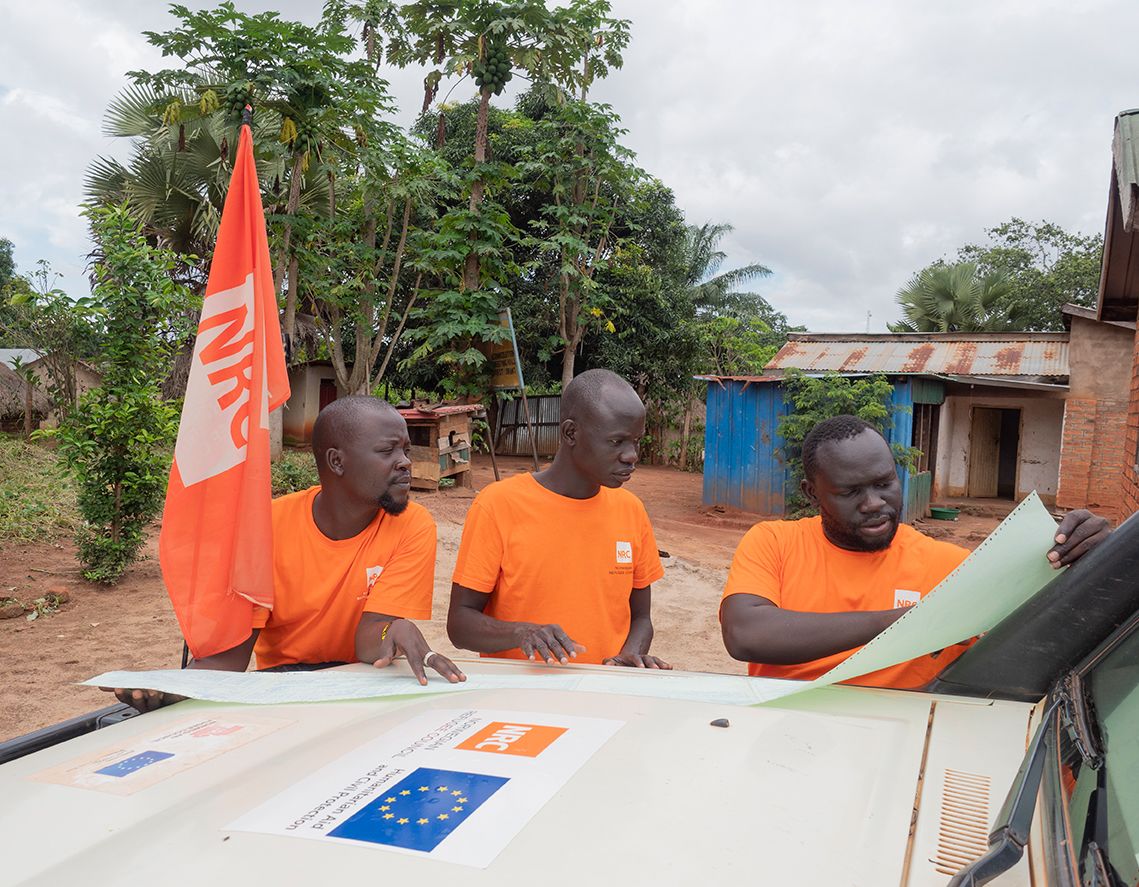
The team has spent the first morning in Ezo meeting displaced families to assess their situation and identify needs. Photo: Ingrid Prestetun/NRC
“I have been to school through tough times, and I always like encouraging displaced children by telling them about my own experience and advising them to persist and go on with their education. It is always important to hope, even in the most difficult situation. Hope for the future, hope for better things is very important.”

“Coming to Ezo brings back childhood memories: how we left our home village fleeing towards the Central African Republic," says Sitima Joyce Justin. Photo: Ingrid Prestetun/NRC
“Coming to Ezo brings back childhood memories: how we left our home village fleeing towards the Central African Republic," says Sitima Joyce Justin. Photo: Ingrid Prestetun/NRC

Sitima Joyce Justin talking to Christine Angudeyo, headteacher of Progressive Primary and Nursery School in Ezo County. Photo: Ingrid Prestetun/NRC
Sitima Joyce Justin talking to Christine Angudeyo, headteacher of Progressive Primary and Nursery School in Ezo County. Photo: Ingrid Prestetun/NRC

The team has spent the first morning in Ezo meeting displaced families to assess their situation and identify needs. Photo: Ingrid Prestetun/NRC
The team has spent the first morning in Ezo meeting displaced families to assess their situation and identify needs. Photo: Ingrid Prestetun/NRC
Leju Dickens Dingiri, 46
POSITION: Protection Officer
BACKGROUND: A bachelor’s degree in Education and a master’s degree in Development Studies. He has been displaced several times and lived as a refugee for many years in Uganda. His family are still living as refugees in Uganda.
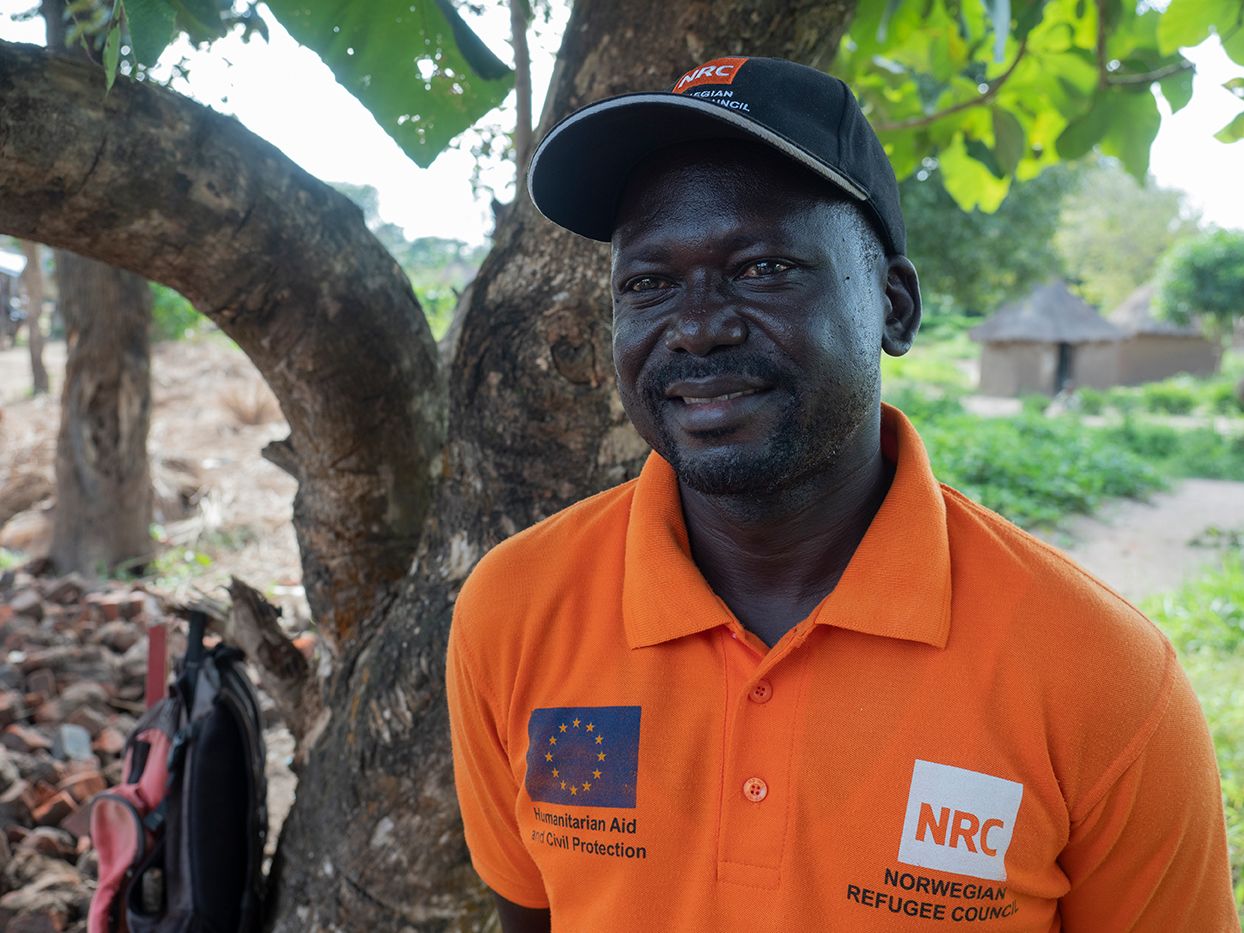
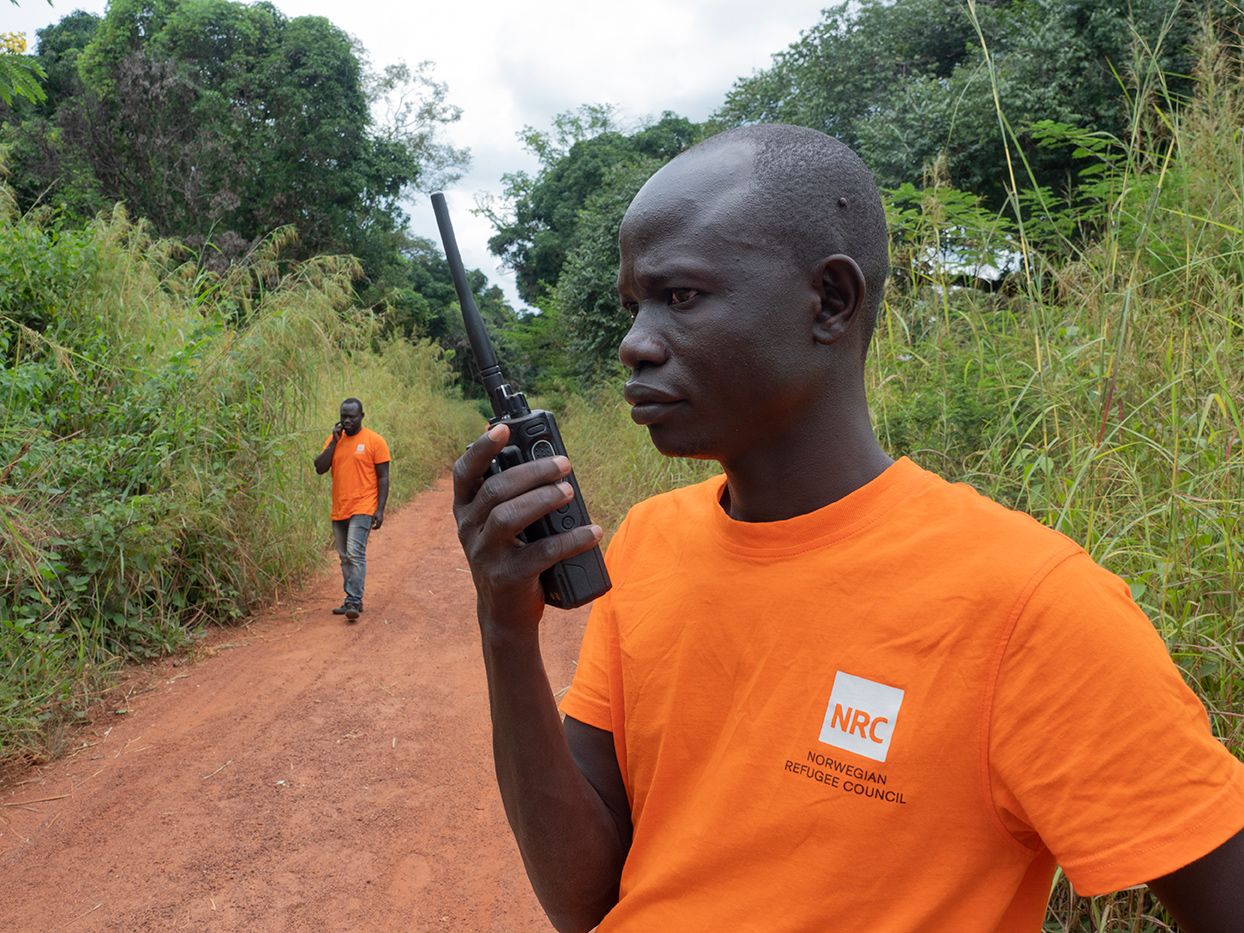
Frequent security checks are important in this area so that the team can evacuate quickly if something happens. Here, team member Obale Moses radios a colleague. Photo: Ingrid Prestetun/NRC
Frequent security checks are important in this area so that the team can evacuate quickly if something happens. Here, team member Obale Moses radios a colleague. Photo: Ingrid Prestetun/NRC
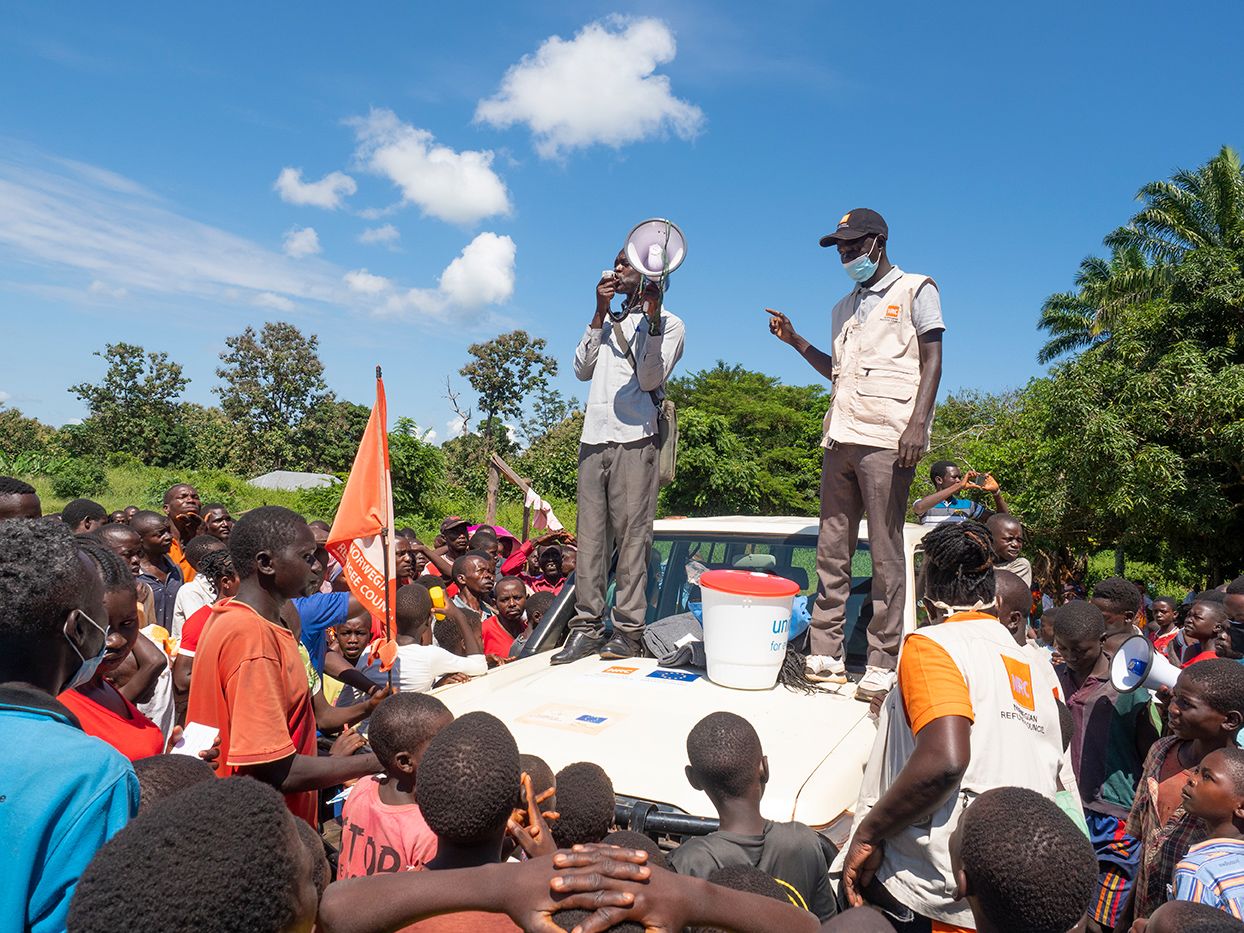
The team distributes essential supplies such as tarpaulins, blankets, mosquito nets, clothes, solar lamps, cooking facilities, buckets, soap and other hygiene items. Photo: Ingrid Prestetun/NRC
The team distributes essential supplies such as tarpaulins, blankets, mosquito nets, clothes, solar lamps, cooking facilities, buckets, soap and other hygiene items. Photo: Ingrid Prestetun/NRC
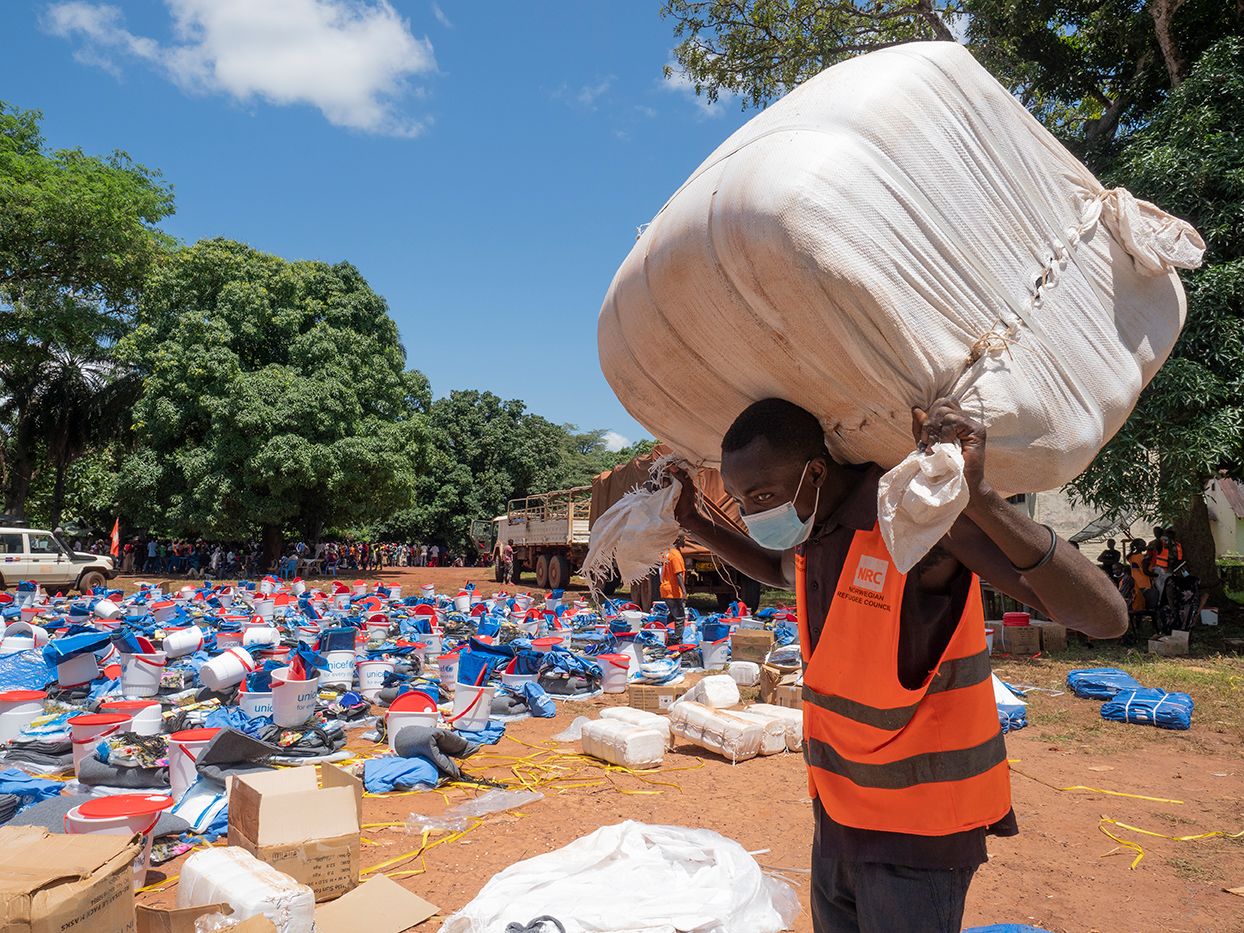
A full distribution to more than 7,500 people can take several days. Photo: Ingrid Prestetun/NRC
A full distribution to more than 7,500 people can take several days. Photo: Ingrid Prestetun/NRC
Leju is filled with emotions. Just a few weeks ago, he escaped the fighting and killing in Tambura.
“About three weeks ago I was evacuated from Tambura, the same place these people just fled from. It was a Saturday and there was rapid gunfire from around 10am to 5pm. I was afraid and was really worried that I might not get out of that place,” he says.

Frequent security checks are important in this area so that the team can evacuate quickly if something happens. Here, team member Obale Moses radios a colleague. Photo: Ingrid Prestetun/NRC
“These people who are displaced from Tambura, and now arriving here in Ezo, are people who are really in need of assistance. They basically left their houses without taking anything with them. Our presence here is very important to help them survive the coming days, weeks and months.”
As a protection officer, Leju looks for people showing signs of physical and emotional disturbance so that he can provide psychological first aid and link those with serious emotional problems to more specialised service providers.
“The first experience when I arrive in a new displacement site is usually the feeling of pain, anger, heartbreak and frustration at seeing people being forced to live in miserable conditions with very limited basic services. However, I try to show them that it is not the ‘end of life’ and they should not hold themselves to blame,” he says.

The team distributes essential supplies such as tarpaulins, blankets, mosquito nets, clothes, solar lamps, cooking facilities, buckets, soap and other hygiene items. Photo: Ingrid Prestetun/NRC
Leju knows what it is to flee for his life and seek refuge.
“I have been displaced several times in my life. I spent my childhood in a refugee camp in neighbouring Uganda, and I only returned to South Sudan as an adult. About three years ago, we were again displaced and returned to Uganda. Now my parents and children are living as refugees in Uganda. Here it is not safe. There the children have access to education and can live together with their grandparents and receive support from them.”
“I want to serve my own people”
In the meantime, Leju is trying to support the people in his homeland.
“I decided to come back to the country in order to serve my own people, to find work and resettle,” he says.
When he returned to South Sudan, he got a job with NRC.

A full distribution to more than 7,500 people can take several days. Photo: Ingrid Prestetun/NRC
“It was important for me to get a job in the humanitarian sector where I can serve the people who have experienced a similar life to me. Living as a refugee is a hard life and these people really need support, especially in areas that are very hard to reach. I have served in many parts of the country, and I really feel proud to have made that contribution though working at NRC.”
Loke Raymond Okello, 31
POSITION: Shelter Officer
BACKGROUND: A bachelor’s degree in civil engineering. He has been displaced and lived as a refugee in Uganda for several years.
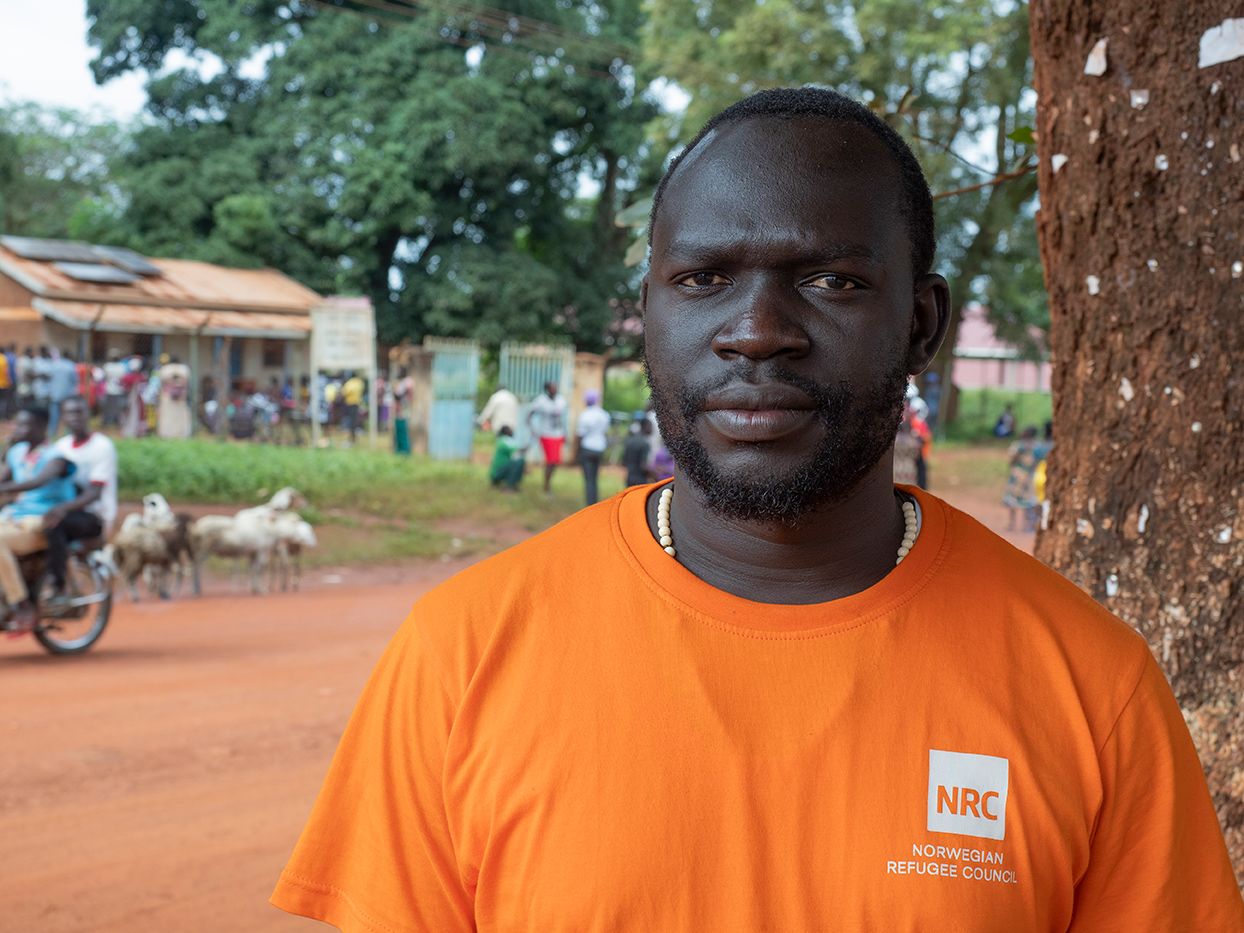
Raymond has spent the first morning at the site in Ezo and met displaced families, mothers, and children to assess their situation and identify needs.
“I saw children with swollen feet who had been walking for seven days or more from Tambura to Ezo. Some were injured and some were without clothing. These are horrible scenes,” he says.
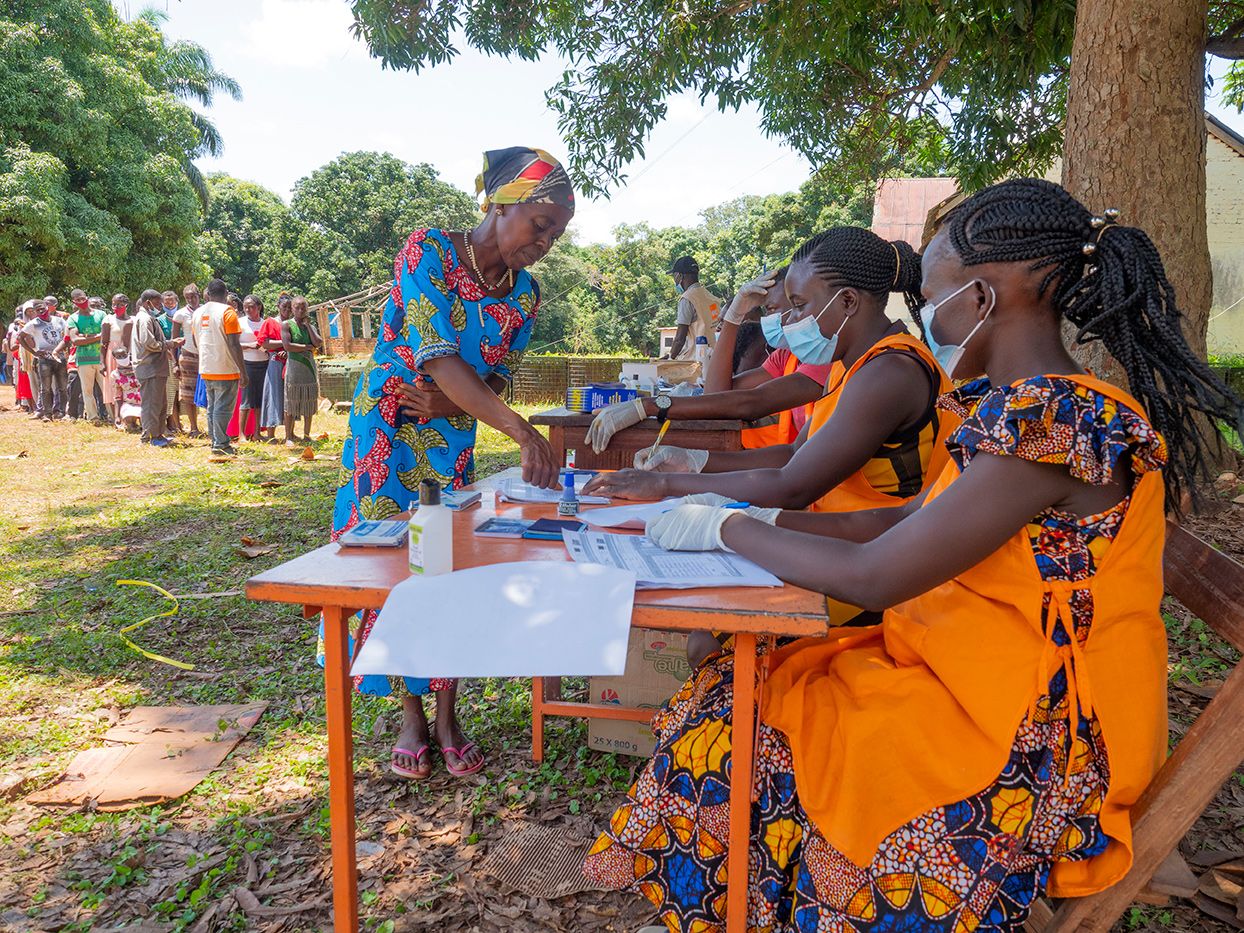
Regina, 37, is registered and will receive blankets, mosquito nets, clothes, cooking equipment and other essential supplies. Photo: Ingrid Prestetun/NRC
Regina, 37, is registered and will receive blankets, mosquito nets, clothes, cooking equipment and other essential supplies. Photo: Ingrid Prestetun/NRC
Raymond is the shelter expert in the team, but he must deal with other needs as well.
“Very often we are the first on the ground to meet the humanitarian needs. The most important priorities are food and shelter, but many displaced people suffer from trauma due to all the bad things that have happened to them. I meet with newly arrived families, and you can see the stress on their faces. They are traumatised,” he says.
“They tell you stories about people getting slaughtered. A pregnant woman was slaughtered, and her belly was cut open. They removed the child that was inside and slaughtered the child. It is horrible to hear such stories. Being the first to arrive you are also the first to hear them. It is hard.”
“We try to be strong and not show too many emotions because it can make people feel like there is no hope of things getting better,” Raymond continues.
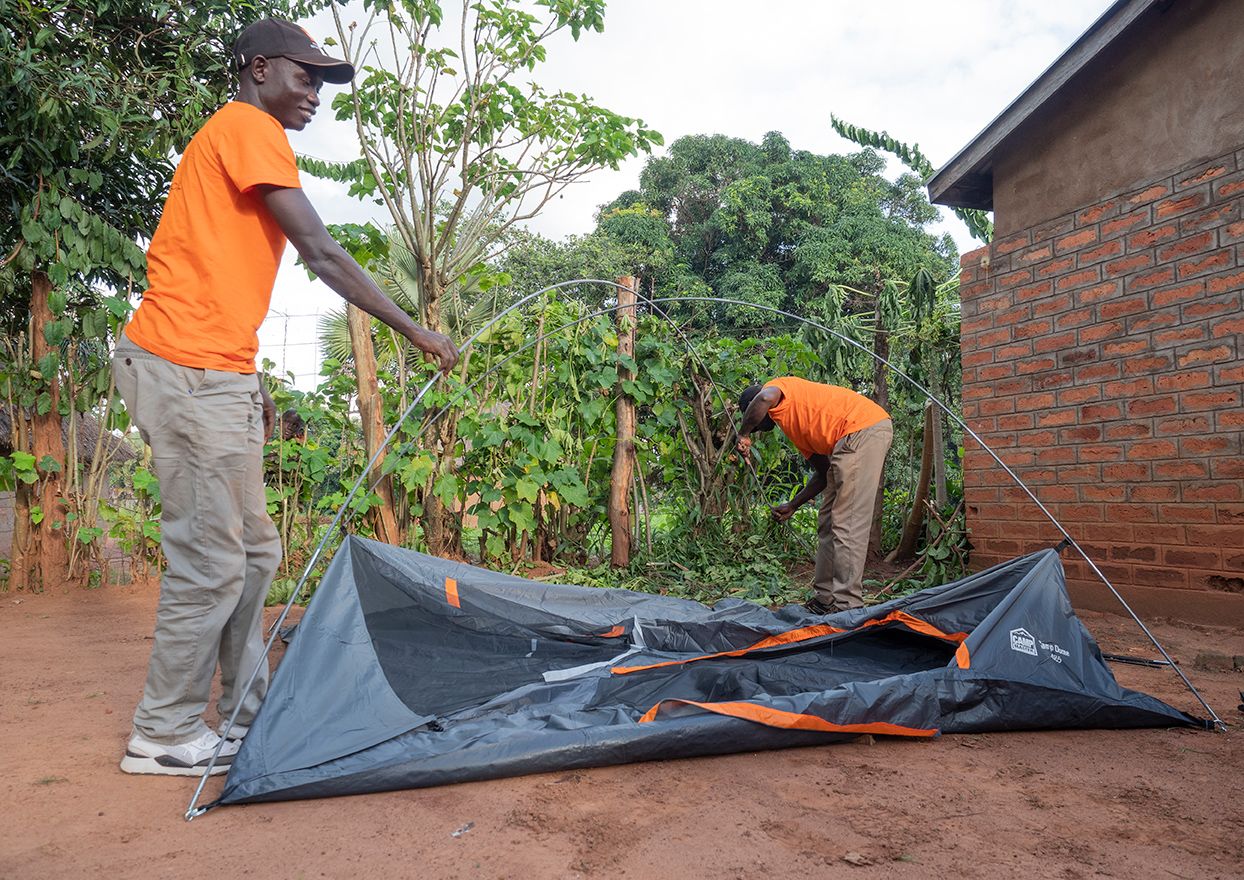
The team members have to bring their own tents. Photo: Ingrid Prestetun/NRC
“I chose to be a humanitarian worker because I have been in a situation like they are in now. I have been displaced and a refugee for quite some time. At the end you lose hope, but it was the humanitarian workers who gave us hope again.
“It is important to be a humanitarian worker. I feel good. Me and my team are doing a lot of work and changing people’s lives.”
“We can see their smiles and faces changing”
For Raymond the work has become a passion for him. “I love to just give back and touch people’s lives, see the smiles on their faces and bring about change,” he says.
We talk to Raymond as he is about to leave the site, where he has finished distributing essential supplies such as tarpaulins, blankets, mosquito nets, clothes, solar lamps, cooking equipment, water buckets, soap, and other hygiene items.
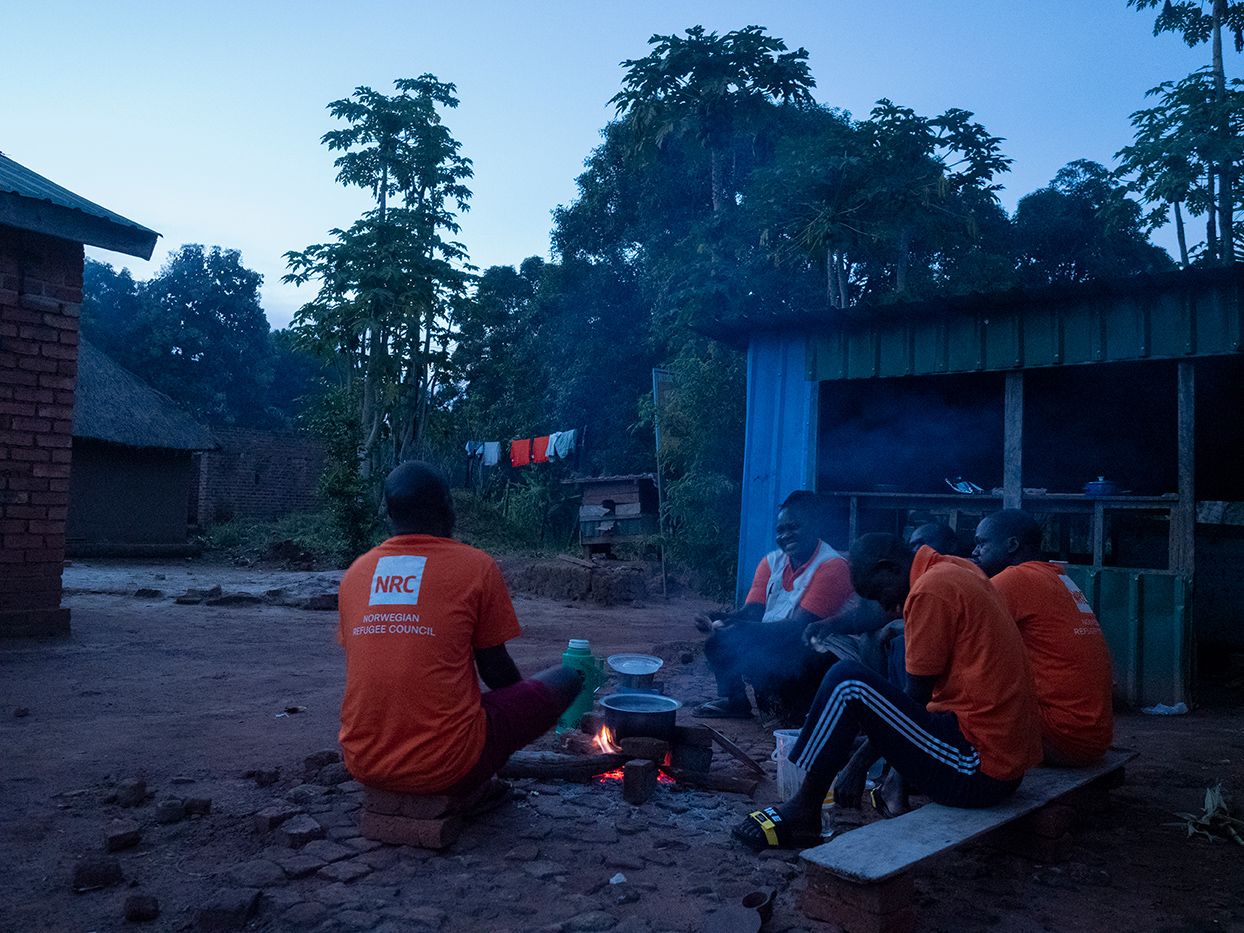
The team can finally rest before going to sleep. “We feel we have accomplished something as a team,” Raymond says. Photo: Ingrid Prestetun/NRC
“It was difficult, but we are happy that we came to Ezo, because after a week of interacting there was a growing feeling of hope. Being with the displaced for so many days, we can see their smiles and faces changing, and the children playing. We feel we have accomplished something as an emergency response team,” he says.

The team members have to bring their own tents. Photo: Ingrid Prestetun/NRC
The team members have to bring their own tents. Photo: Ingrid Prestetun/NRC

The team can finally rest before going to sleep. “We feel we have accomplished something as a team,” Raymond says. Photo: Ingrid Prestetun/NRC
The team can finally rest before going to sleep. “We feel we have accomplished something as a team,” Raymond says. Photo: Ingrid Prestetun/NRC





